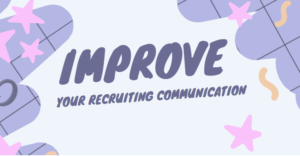
Good communication skills are important in practically every facet of the corporate world and as a recruiter, these skills are absolutely essential. With daily responsibilities comprised of conversations via phone and face to face, email correspondence and presentations, and writing quality job ads and descriptions, having the ability to deliver your message concisely is possible through outstanding communication skills.
You may have some extra time to reflect on your soft skills and communication is a great area to improve on. More than ever you need to invest in yourself.
Why are Communication Skills are Important?
Recruitment is a time-sensitive process, and being able to prioritize tasks and meet deadlines is crucial to success.
Recruiters are often juggling multiple responsibilities, such as sourcing candidates, conducting interviews, and communicating with hiring managers. Good time management allows recruiters to handle these tasks efficiently and effectively.
Having a good time management system in place can help recruiters avoid burnout, by allowing them to balance the demands of the job with their personal life.
Good time management can help recruiters to build stronger relationships with candidates and hiring managers, by allowing them to respond to communications and follow up on leads in a timely manner.
With the current scenario, the competition for talent is high, and companies are looking to fill positions as soon as possible, recruiters with strong time management skills will be able to fill positions quickly and efficiently.
In this digital era, recruiters need to be able to navigate through a high volume of resumes and job applications, time management skills will help them to quickly identify the best candidates.
I’ve compiled the following suggestions that will help you communicate effectively:
1. Practice Speaking
As a recruiter, you have a lot of responsibilities, so time is of the essence. Communicating important information to clients, candidates, and so on doesn’t need to be long and drawn out. Rather, knowing how to best relay the information with precision requires practice. President Abraham Lincoln delivered the famous Gettysburg address in less than 3 minutes. Enroll in a class that teaches communication skills, read books on the topic, or find a mentor. Another great way to get practice is to join a Toastmasters group in your area.
2. Get to the Point
When communicating, determine the message you want to relay, keeping it short and to the point. The internet has essentially put the world at our fingertips, which is beneficial in countless ways. By that same token, professionals are suffering from information overload. During a cold call you will need to be direct and straight forward. I recommend recording your phone screens to better understand how you are managing the flow of your phone call. Here’s more tips on improving your phone screens (here).
3. Keep Your Audience Engaged
Whether you are having a one on one conversation, creating a video for your website, or sending an email, you want to keep the attention of your audience. The message you deliver may be extremely compelling, but the human attention span is a mere 8 seconds. Keep them engaged by encouraging their feedback, asking direct questions, and inviting them to share their views.
4. Confirm Comprehension
Make sure your audience understands the message you’re trying to convey. When they are involved and feel comfortable asking questions, then clarification is much easier. Say it a few different ways if necessary. How to Win Friends and Influence People is a great book to understand the value of building relationships and staying on topic with others.
5. Listen to Others
Communication is a two-way street in any form, written or verbal. Truly listening to what the other person is saying without being tempted to dominate the conversation is a quality of an excellent communicator. Make sure that you are pausing and allowing others to respond in an effect manner. If they bring up a story or idea follow up with a question or reflect back it out. Also, make sure to mention the listeners name throughout the talk. A listener always loves to be the main focus of the conversation.
6. Pay Attention to Body Language
Body language is considered a non-verbal form of communication and we all use it in our daily lives. From hand gestures, posture, and facial expressions, body language can be a good indicator as to whether or not the other person understands your message. Likewise, be aware of what you are communication with your body language. Yes, social distancing will make this more difficult to see or understand.
7. Make Eye Contact
Making eye contact with the other person is yet another form of non-verbal communication. When listening to others, it shows you are completely focused on and care about what they have to say, which nurtures trust and loyalty.
8. Tone of Voice
This is more psychological. Try and have a calm yet direct tone. To practice this make sure to stand during your calls – your voice will raise and sound uplifting over the phone. It’s a simple yet highly effective way to improve on this area.
Finally, our greatest leaders were excellent communicators, it is the skill ranked most important; even above technical skills and work ethic. Thus, being equipped with good communication skills will enable you to win again and again.
I strongly recommend watching this presentation:
Recommended Reading:
10 Note Taking Tools for Recruiters
SourceCon Roundtable Mike and Jonathan’s Recap
Breaking SourceCon Seattle Goes Digital
6 Augmented Writing Tools for Recruiters
- Unlocking the Power of Perplexity AI: Why Recruiters Should Utilize This Revolutionary Tool - February 11, 2024
- Exploring AI Interviewing Assessment Tools: A Comprehensive Review - November 30, 2023
- PartyRock a Sandbox for Talent Sourcing - November 29, 2023
